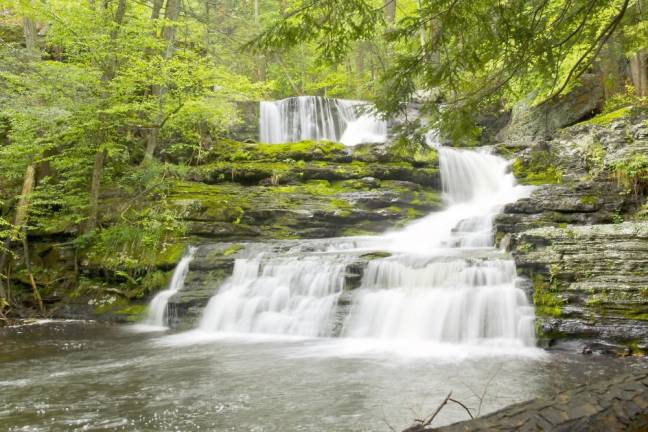Construction to begin at Childs Park
Bushkill. Extensive repairs stemming from storm damage will soon begin, and Childs Park will likely reopen in the spring of 2024, with one new trail and other structures and an old trail permanently closed.


A contract has been awarded for the next phase of restoration and construction work at George W. Childs Park (Childs Park) in Delaware Water Gap National Recreation Area, National Park Service (NPS) officials have announced. The site has been closed since March 2018, when two back-to-back winter storms, Quinn and Riley, wreaked havoc on the area. Heavy ice and snow and high winds brought down thousands of trees and closed roads and trails throughout the recreation area. Work will begin this fall with most construction work taking place in the spring and summer of 2023. The site is expected to re-open to the public in the spring of 2024.
The 155-acre site along Dingmans Creek is a popular destination in the park, featuring three scenic waterfalls surrounded by an historic trail system that threads through a cool, shady eastern hemlock ravine. Childs Park was the original vision of wealthy Philadelphia philanthropist and publisher George W. Childs who, along with friend George Donaldson, developed rustic trails and dedicated it to the public in 1892 as a place for people to enjoy nature. Childs died in 1894 and his widow donated the site to the Commonwealth of Pennsylvania in 1912. It was operated as a state park until 1983 when the Commonwealth donated the property to the NPS.
While under state park ownership, military veterans serving in Civilian Conservation Corps (CCC) at the nearby Edgemere camp constructed numerous structures, including the timber Ranger Cabin complex in 1935. They also constructed picnic pavilions and pump shelters, improved trails, and planted native vegetation, including hemlock trees. This year, a team of professional wood-crafting experts from the NPS Historic Preservation Training Center repaired severe damage to the Ranger Cabin caused by the storms to stabilize the historic CCC-constructed building.
Winter storms Quinn and Riley caused an unprecedented amount of damage to utility lines, roads, trails, and structures, primarily due to falling trees. At Childs Park, the wind, ice, and snow uprooted trees which caused entire hillsides to slide downhill, taking the trails with them. Trees crushed trail bridges and choked Dingmans Creek and the waterfalls and caused heavy damage to CCC-era historic buildings.
Following the storms, park crews prioritized clearing and opening roads, assessed the widespread damages to trails, infrastructure, and structures, and sought funding for repairs. Most trails were re-opened within a year except for a few where damages and repairs were more costly and more complex, such as Lower Hornbecks Creek, Van Campens Glen, and Childs Park. Damages to the Adams Creek trail were so severe that the trail has been closed permanently.
“Storm impacts at Childs Park were significant, and restoration and repair are complex processes, especially given the sensitive environment in which it is taking place,” explained Kara Deutsch, who leads the park’s Resource Management and Science team. “When work is completed, Childs Park will be equally beautiful but safer and more resilient than it was before.”
Work that has already been completed in preparation for this stage of the restoration, includes removal of downed trees, damaged railings and posts, and a failed section of trail on an unstable slope; completion of required natural and cultural resource studies and environmental compliance processes; and coordination of the engineering and design for trail improvements and repairs to bridges and other built structures.
Chief of Facility Management Bill Tagye, who is overseeing the construction phase of this project, explained that a considerable amount of work is also done behind-the-scenes such as securing funding and contractors for each stage of the restoration work, working with engineers on the trail and bridge designs, and ensuring that the project complies with natural and cultural resource protection laws. “Without that,” he added, “nothing can happen on the ground.”
On-site work during this phase of the restoration includes:
• paving a portion of the existing trail and minimizing the slope from the parking area to the Woolen Mill sign exhibit to improve accessibility and drainage;
• installing a new accessible section of trail from the first bridge to the historic handpump shelter;
• removing an unsustainable stretch of trail between the second and third bridge on the west side of Dingmans Creek;
• repairing damage or replacing components of the trail, bridges, picnic sites, boardwalk, stairs, overlook areas, interpretive exhibits, and trail guardrails throughout the site; and
• installing a trail and stair retaining system near the fourth bridge.
In addition to active construction, other work during this phase of repairs will include surveying and project layout, vegetation clearing and stump/root removal for trail work, and procurement of supplies and materials. No work will take place during the winter months and construction is planned to resume in the spring of 2023.
Work will be completed by Puyenpa services, LLC from Gaithersburg, MD 20877, a company experienced in trail construction and familiar with sensitive natural and cultural resources.
Childs Park remains closed to the public until construction is completed.